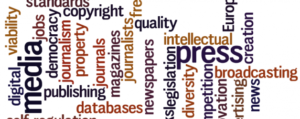
Image: epceurope.eu
While, it is necessary that all of us be engaged in building the common good – the press establishes the national dialog on major issues. When the press focuses on reporting problems only, with no solutions, monitoring or follow up we are left with a sense of frustration, desperation and hopelessness. One way the press can make a difference is to stick up for the people who cannot defend themselves. Recently, the PBS News Hour, assigned their correspondent to follow a three year old immigrant girl through her process of being reunited with her parents after separation at the border. PBS by staying on the story, asking the hard questions and continuing to press the administration for her status illuminated the fate of thousands of other children. A week ago, The New York Times completed an in depth analysis of the Trump family fortune and how Donald Trump acquired his fortune essentially as a gift from his father paying very little in taxes.
We see these in depth analyses and vigilant reporting as necessary to keep the truth flowing to citizens to help them make good decisions. Yet, reporting on major topics often winds up being a sound bite of 30 seconds or a few short sentences quoting a Senator or Congressman with very little context. The text of what the legislator says is scrolled across the bottom of the TV screen in summary form, with no data, context or way to follow up.
The internet makes available a wide variety of reliable research sources such as local, state and federal government agencies, non-partisan research groups and universities. Corporations have finely tuned their decision processes around a simple approach – gather data from all sides of an issue or topic both qualitative and quantitative, analyze the data, look into various solutions, present multiple solutions to decision makers, then decide.
The public today has major issues that need to be addressed by government agencies and their leaders – we need high quality reviews and analysis available to everyone to make good voting decisions. The old style of journalism focused on a lead to grab attention and then fill in the details later through the body of the story or at the end needs to be examined in the Internet age. Front page news can continue to present headline stories, yet they should be placed into context, with qualitative and quantitative data, presented graphically for easy viewing, with expert analysis from 360 degree points of view.
The fact there are only a few national newspapers, which fewer people are reading does not help the situation toward building the Common Good. We need Internet providers like Facebook, Google and Twitter to be the next generation of journalists, instead of feeding the fragmentation and opinion masquerading as news. A quick reading structure to the story, using multimedia maybe thought of as the ‘teaser’, graphics and charts with expert analysis from multiple points of view. Every story needs to go the next step and focus on how to solve the problem presented. Often, only problems are published leaving the reader with no way to take action. Some stories, do leave Internet links or ways to contribute to a family who had a fire and needs shelter. Yet, the major stories of our time: climate change, opioid epidemic, workers being left out of the economic mainstream, loss of hope in ghetto areas, or escalating health costs are not covered in an action enabling format. In this blog we have taken a building toward the common good and action approach by starting with a basic issues, providing a graphic of data from a non-partisan source, then follow up alternatives and action to solve the.problem.
The press needs to take responsibility for the fractionalization happening when a constant drone of problems are broadcast to people with no follow up, no facts for building a common understanding, presentation of alternatives and next steps for action to solve the problem. We need to become a problem solving society and the press in how they communicate issues to us can take us a long way toward a common good building nation.
